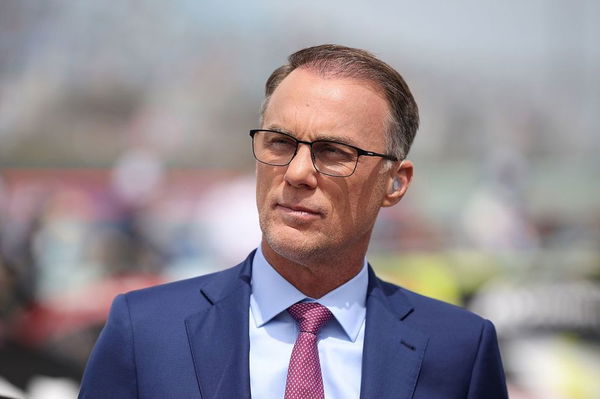
via Imago
From motorsport.com

via Imago
From motorsport.com
NASCAR fans and insiders have noted growing tension surrounding the sport’s scheduling strategy. This is particularly concerning Saturday night races. Viewership numbers consistently point toward a performance dip when events air on Saturday nights. This suggests a widening disconnect between NASCAR’s traditional prime-time positioning and modern broadcast realities. While these numbers have been fairly obvious, Kevin Harvick has recently questioned the reasons behind the NASCAR schedule that remains unchanged.
Media analysts and stakeholders have repeatedly flagged this issue to the public. Sunday afternoon events, historically NASCAR’s traditional slot, continue to outperform their Saturday night counterparts. Across the sport, data from the 2025 season underscores the trend. Not just in Richmond, but ratings declined at other venues too, exposing vulnerabilities in the current scheduling model. These mounting losses foreshadow the sharp, unscripted outburst by Kevin Karvick that would follow during a recent episode of the Happy Hour.
ADVERTISEMENT
Article continues below this ad
Kevin Harvick voices his frustration over Saturday night NASCAR schedule
Kevin Harvick didn’t hold back on Happy Hour, expressing raw exasperation with the NASCAR schedule. Reflecting on moving a race from Sunday to Saturday in Richmond, he stated, “We go from Saturday to Sunday at Richmond. TV numbers go up. We go from Sunday to Saturday, crowd goes up. … I’m more concerned … how many people are sitting in the grandstands because that’s what makes it go around.” The emphasis was clear: TV viewership, not attendance, should drive the schedule. His sentiment defied nostalgia and tradition. It reframed the debate emphatically for many fans and officials.
Harvick’s four-word frustration struck hard: “It makes no sense.” He argued, “Sunday afternoon. Yeah. … There’s no Saturday night racing in the history of NASCAR since the Bristol night races that has scored well in the last five years.” He spoke about how football season further erodes viewership for Saturday nights. His tone mixed passion with provocation, challenging the sport’s leadership to re-evaluate weekend planning. This wasn’t mere commentary. It was a pointed call for structural change in pursuit of audience growth.
Harvick’s comments resonate even deeper when matched with hard evidence. He cited Richmond again, “Richmond Raceway’s Saturday night Cup Series race in 2025 brought in just 1.39 million viewers. This was a steep 37% drop from the prior year’s Sunday event at the same track, which drew 2.22 million.” Those statistics reinforce his claim that ratings losses of such magnitude cannot be ignored.
“It makes no sense.” @KevinHarvick is not a fan of Saturday night Cup Series races. pic.twitter.com/nznRRL8tbi
— HarvickHappyHour (@HarvickHappyPod) September 9, 2025
Kevin Harvick’s unfiltered frustration delivered in blunt, four-word clarity flagged a stark truth. Saturday night, the NASCAR schedule may be out of step with how modern audiences consume motorsports. His arguments are bolstered by consistent data showing Sunday airings yield significantly higher ratings.
Yet, with Bristol preparing for its under-the-lights Truck Series showdown, the sport once again leans into the spectacle of a Saturday night weekend starting a day early on Thursday. This puts added weight on qualifying results that could reshape the playoff picture.
ADVERTISEMENT
Article continues below this ad
What’s your perspective on:
Is NASCAR clinging to tradition at the cost of viewership? Harvick's frustration might be justified.
Have an interesting take?
Top Stories
Playoff tensions reignite ahead of Thursday night race
The NASCAR Craftsman Truck Series playoffs have entered high gear as teams converge on Bristol Motor Speedway for a pivotal elimination round. With the UNOH 200 presented by Ohio Logistics scheduled for Thursday, September 11, the setup already brims with anticipation. Practice heats follow at 3:05 p.m. ET, and a single-round, two-lap qualifying session is set for 4:10 p.m. ET on FS2. What emerges from that session will shape the fate of several playoff hopefuls.
This race is more than just another stop in the seven-race playoff ladder. It marks the second event in the Round of 8, where each starting position carries heavy weight. Bristol’s short track history and unforgiving layout ramp up the stakes, demanding precision at every turn. The choices made in qualifying could make or break championship dreams.
ADVERTISEMENT
Article continues below this ad
When qualifying concluded, the top starting positions were set by a combined metric of earlier performance. 70% from the previous race finish by the owner, and 30% from the current owners’ points. Out front, Clay Greenfield, in the No. 95 truck, claimed the top qualifying spot, followed closely by Greg Van Alst (No. 35) and Connor Jones (No. 41), all landing in group 1 of the session. These early qualifiers now have a strategic jump on the rest of the field, a decisive advantage in the playoff calculus.
Clay Greenfield’s pole run put him in command, but the spotlight now shifts to how the rest of the playoff field responds under Bristol’s lights. With elimination pressure looming, every grid position carries the weight of survival, ensuring Thursday night’s UNOH 200 will be decided as much by qualifying gains as by the chaos that inevitably follows once the green flag drops.
ADVERTISEMENT
ADVERTISEMENT
ADVERTISEMENT
ADVERTISEMENT



Is NASCAR clinging to tradition at the cost of viewership? Harvick's frustration might be justified.